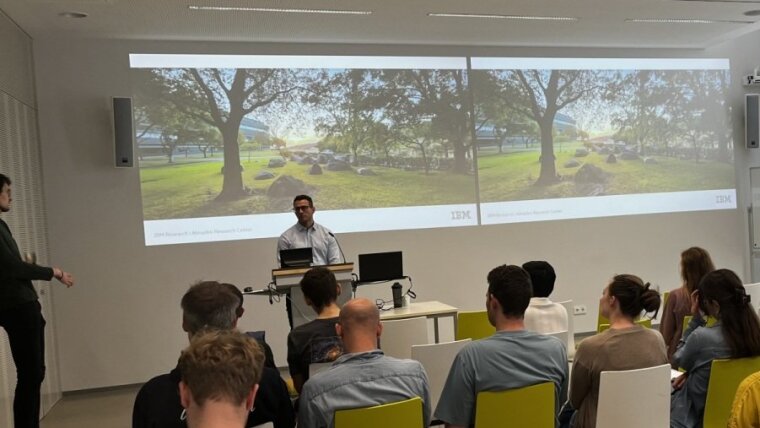
Published:
On July 4th, 2024, the Lecture Hall of ZAF hosted a highly anticipated seminar featuring Dr. Tim Erdmann, who introduced ChemChat, an innovative web application and conversational assistant designed to transform material science and data visualization. Dr. Erdmann, a renowned researcher with a distinguished background in polymer chemistry and artificial intelligence, leads the ChemChat project at IBM Research.
Seminar Title:
ChemChat | LLM-Powered Conversational Assistant for Material Science and Data Visualization
Abstract:
Dr. Erdmann addressed the current challenges in computational chemistry and machine learning, highlighting the steep learning curves and isolated operations of existing AI tools. He pointed out that large-language models (LLMs) like GPT have revolutionized various domains but have limited efficacy in addressing chemistry-specific challenges due to a lack of domain knowledge and accurate referencing capabilities.
ChemChat aims to bridge this gap by integrating existing cheminformatics tools and expert-developed AI models, including PubChem, CIRCA, RDKit, GT4SD, RXN, and MolFormer. This application assists chemists in various tasks such as molecule investigation, property calculation, prediction, generation, retrosynthesis, data visualization, and literature research. The central theme of the talk was demonstrating ChemChat’s use case-specific capabilities and its underlying architecture and workflow.
About Dr. Tim Erdmann:
Dr. Erdmann holds a PhD in Polymer Chemistry from TU Dresden/CFAED, with a specialization in semiconducting polymers. Since joining IBM Research in 2017 through a Feodor Lynen Postdoctoral Research Fellowship of the Humboldt foundation, he has made significant contributions to the field. His journey from working on conductive polymer-based sensors to leading the ChemChat project showcases his dedication to leveraging AI for scientific advancement. Dr. Erdmann is also responsible for the Chemspeed synthesis robot, installed in Spring 2024, which is planned to be integrated into an autonomous synthesis platform with AI optimization algorithms.
Key Highlights of ChemChat:
- Integration of Cheminformatics Tools: ChemChat seamlessly integrates tools such as PubChem, CIRCA, RDKit, GT4SD, RXN, and MolFormer.
- Capabilities: The application supports molecule investigation, property prediction, retrosynthesis, data visualization, and literature research.
- User-Friendly Interface: A chatbot-driven user interface powered by non-GPT/OpenAI LLMs makes ChemChat accessible to experimental scientists without extensive programming knowledge.
- Demonstration of Use Cases: Dr. Erdmann showcased ChemChat’s effectiveness in specific use cases compared to related applications.
Dr. Erdmann’s presentation underscored the potential of ChemChat to significantly enhance the utilization of cheminformatics tools and AI models, contributing to scientific discovery and education.
We extend our gratitude to Dr. Tim Erdmann for sharing his expertise and providing a glimpse into the future of AI-driven material science.